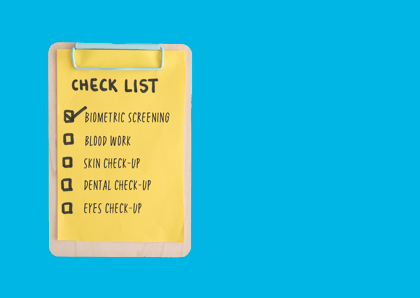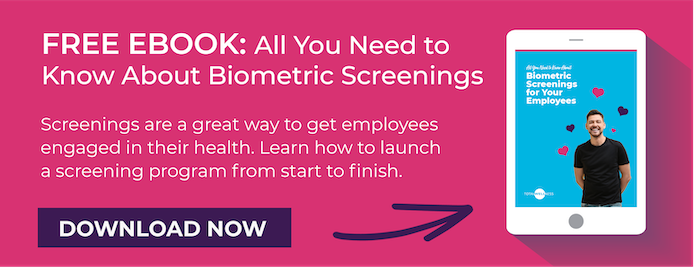 Just like that, the new year is roaring in.
Just like that, the new year is roaring in.
January is the time when everyone is making their resolutions to eat healthier, get stronger, and hit the gym more.
In general, people are interested in creating positive lifestyle changes.
To ride that wave of wellness enthusiasm, it’s smart to snag your employees’ attention about getting a biometric screening. These screenings are a perfect starting point for your employees to track their health from January and on.
It may also inspire them to knock out the rest of their necessary annual testing, too.
Below we dive into several important health tests and screenings everyone should schedule for a happy and healthy new year.
Why Check-ups and Screenings are Important
We all have certain tasks we don’t like to do. At the top of that list for most people are doctors’ appointments and health testing.
Dislike it as you may, scheduling regular health screenings can help you nail down health issues before one becomes too serious. When you take the time to schedule appropriate screenings, tests, and health services, it can help you get treatment for health conditions much sooner.
Or, even just confirm you’ve got an excellent bill of health.
Screening tests are not diagnostic tools, but are mostly used to identify who needs additional testing to rule out health conditions. That’s why a biometric screening, in particular, can be a helpful starting point.
In addition to a biometric screening, bloodwork and other check-ups can provide the best overall insight to your health.
Here’s a look at 10 health testing and screenings to consider:
Recommended Screenings for Males and Females
The following recommendations are simply that — recommendations. It’s best for every individual to work with their primary care physician to decide on the appropriate timing and frequency of screenings. This will likely be determined by your medical history, age, and overall health.
Biometric Screenings
Kicking off the year with a biometric screening is a great way to get your employees to take a closer look at their health. Some may have skipped important annual tests over the last year — including physical exams — which is why this particular screening can be so critical.
A biometric screening includes:
- HDL
- LDL
- Glucose
- Triglycerides
- Blood pressure
- Waist circumference
- Total cholesterol
- Height/Weight/Body Mass Index (BMI)
Best of all, employees can get instant results. As an employer, you can also get the details you need to implement the most effective health programs. Consider scheduling a biometric screening early in the year to help your employees set their health-focused New Year’s resolutions.
Blood Work
How often: Annually
When you go in for your annual physical exam, your doctor will likely ask you to get some blood work done. This may include a few tests, like a basic metabolic panel and a complete blood count (CBC) test.
Basic metabolic panel (BMP)
This panel is usually paired with a CBC panel when you go in for your physical. This test measures your sugar levels, kidney function, and fluid balance.
A basic metabolic profile also tests for:
- Calcium
- Chloride
- Creatinine
- Glucose
- Potassium
- Sodium
- Carbon Dioxide
- Blood Urea Nitrogen (BUN)
Complete blood count (CBC)
This panel tests for overall health. A complete blood count test can reveal early signs of many disorders or health concerns such as anemia or an infection. A CBC is used to monitor medical treatment and conditions as well to see how your body may be responding to medications you’ve been prescribed.
A CBC panel tests for:
- Hemoglobin
- Hematocrit
- Platelets
- Red blood cells
- White blood cells
Both of these panels are typically taken prior to or just after your annual physical. By completing these panels yearly, it gives your doctor historical data along with current data to compare and track health progress.
Skin Check-up
How often: Annually
From age 18 on, everyone should consider a full-body skin check each year. If you’ve had skin biopsies done before that were positive for skin cancer or precancerous cells, you may be required to come in more frequently.
What to expect:
- Full body exam
- Detailing your medical history
- Discussion of your skin cancer risk
A dermatologist will do a full body scan with the naked eye — and a magnifying glass in some cases— to look over any suspicious moles or freckles. They’ll discuss with you the importance of tracking any changes in asymmetry, border, color, or diameter of your moles or freckles.
Dental Check-up
How often: Every six months
Oral health is a big part of overall health. When you don’t practice good oral hygiene — including going to the dentist regularly — it can lead to a risk of infection or gum disease.
What to expect:
- X-rays
- Check of bite
- Oral cancer screening
- Removal of stains on teeth
- Demo of proper cleaning techniques
Most dental offices also take x-rays once a year to check for cavities or any shifting of your teeth. If you’ve been grinding your teeth at night, they’ll be able to see any wear or tear on your teeth. A nighttime mouthguard may be prescribed as a result.
Eyes Check-up
How often: Annually
Vision problems or changes should not dictate when you go to the eye doctor. Annual exams check for silent conditions like glaucoma that can cause blindness.
What to expect:
- Vision screening
- Prescription check
- Dilation of eyes
- Review of medical history
The younger you are, the less you have to see the eye doc — unless you wear glasses or have a family history of vision loss.
Bone Density Scan
How often: Every 1- 2 years
This is mostly for older populations, but it may be needed by younger folks, too. A bone density test is currently the only way to detect osteoporosis. The lower the density, the more likely you are to break a bone.
The test will:
- Diagnosis osteoporosis
- Show if you have weak bones
- Predict future chance of breaking bones
- Indicate if osteoporosis meds are working
- Show if bone density is improving, staying the same, etc.
Women can start with this exam at 65 and men at 70, according to the National Osteoporosis Foundation. You may need one sooner if your medications impact bone density.
Colonoscopy
How often: Every 5-10 years (dependent upon history)
Perhaps the most unpleasant of procedures to think about, this one is important — especially for those who may be dealing with digestive diseases like Crohn’s or Ulcerative Colitis. This test detects changes or abnormalities in the large intestine and rectum.
These exams should be scheduled starting at 50. If there’s a family history of digestive diseases, then you’ll need to get one 10 years earlier than the age at which your family member was diagnosed. African Americans should start this exam before age 45. If your first colonoscopy comes back with a normal result, you can wait another 10 years to go back.
Prostate Screening (Males Only)
How often: Varies
There are two ways men can be screened for prostate cancer: Prostate Specific Antigen (PSA) test or a Digital Rectal Examination (DRE). Men should start discussions with their physician about this exam starting around age 40, unless there’s a high risk. Continued need for follow-up exams will be determined by your physician.
Gynecological (Females Only)
How often: Annually
What to expect:
- Pelvic exam
- Breast exam
- Pap smear (every three years)
Women should have a gynecology appointment yearly for a pelvic exam to discuss any pelvic pain, sensitivity, or changes. Every three years a woman may get a Pap smear done, unless a doctor recommends one more often — like if you have a family history of cervical cancer.
Mammogram (Females Only)
How often: Annually (after age 40)
A mammogram is a breast cancer screening that uses an x-ray to detect any tissue changes or abnormal masses in the breast. It takes between five to 10 minutes to complete the exam.
Since breast cancer risk does increase with age, women above age 40 should do this annual procedure. It’s the best defense in catching breast cancer early. If you have a history of cancer in the family or other health issues that increase your risk, then earlier or more frequent exams may be required.
Help Employees Get Ahead of Their Health in the New Year
As an employer, you can encourage healthy behaviors by reminding your workers to get a biometric screening — and other health testing — scheduled at the start of the year.
By getting biometric screening results done early in the year, your employees can catch health issues and take preventative measures ASAP.
In January, once the chaos of the new year has settled, send out a checklist of these health to-dos to your team. They’ll appreciate the friendly reminder and it will give them a nudge to schedule these ever-important screenings and tests sooner rather than later.
Curious about what a biometric screening company does? Reach out today to learn more about the TotalWellness biometric screening process. We’d be happy to answer any questions you may have!



